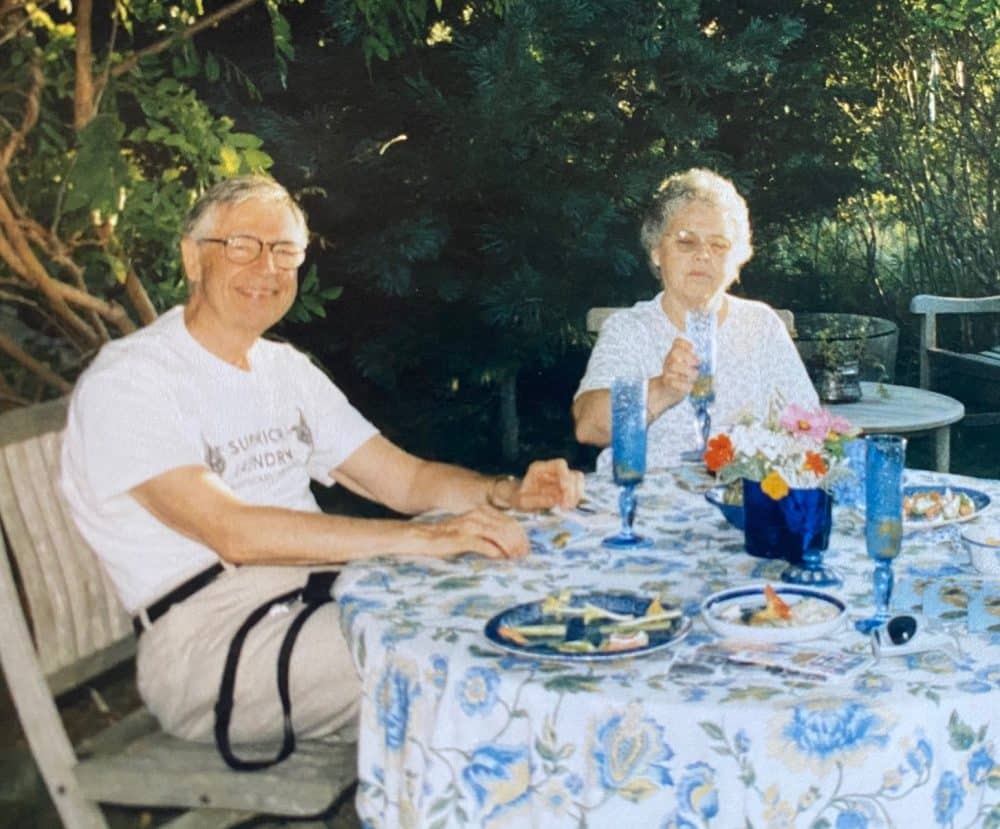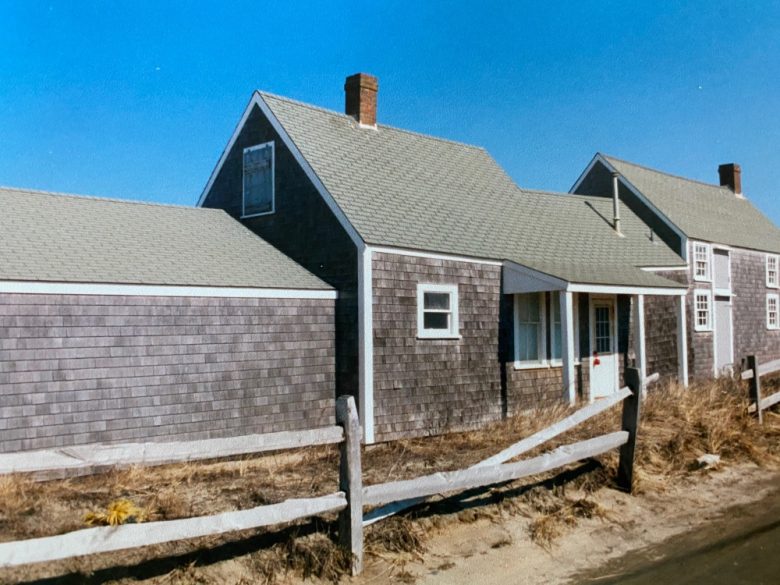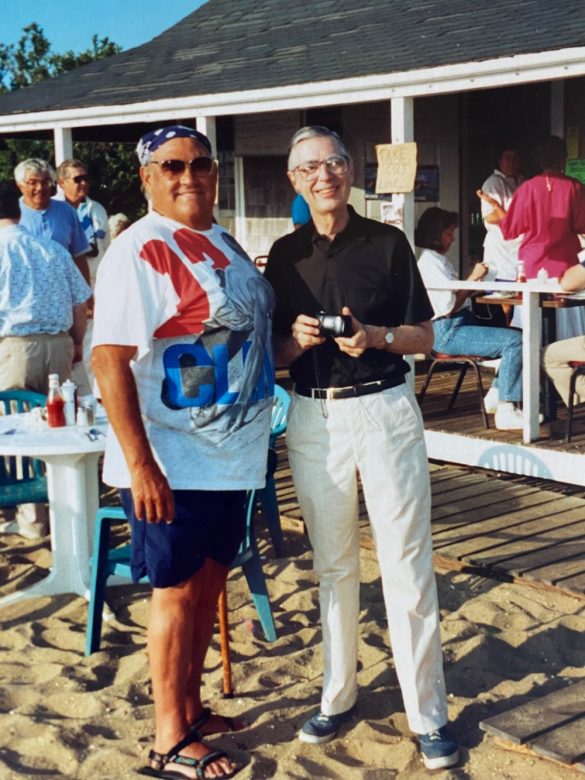Mister Rogers’s Nantucket
For more than four decades, beloved children’s TV host Fred Rogers made this Massachusetts island his summer neighborhood.

Coffee By Design | Portland, Maine
Photo Credit : Katherine KeenanWhen Beverly Hall met Fred Rogers for the first time, the creator and star of Mr. Rogers’ Neighborhood was already a summer regular on Nantucket, where she lived. It was in the early 1970s, and Hall, a painter and photographer, operated an art school on the island’s Old South Wharf. A new summer session had just started up, when in walked a familiar face.
“I think they’d just arrived for the summer when Fred came in with his son, James, and asked if he could enroll him,” Hall recalls. “He was just like the man you saw on television: soft-spoken and kind. From that first moment, the two of us hit it off.”

Photo Credit : Beverly Hall
Over the next several decades, they became close friends. Although Hall was more than a dozen years younger, they had much in common. Both were Nantucket “washashores” (she had moved there in 1964, he had begun summering just a few years before), and both had settled on the western end of the island, well known for its isolation and barren landscape. Most important, though, both were artists who loved working with children.
“We were soulmates, in a way,” Hall tells me by phone from Madaket, where she and her husband operate a small Asian art museum out of their home. “We had these connections. Even when Fred wasn’t on Nantucket, he’d write. And I wrote him back. I always made sure to send him a card for his birthday in March, and I kept all of his letters. He had this wonderful style of writing.”
Once, he wrote to thank her for a photograph she’d taken of a gull and dropped off in his mailbox. “Thank you very much, Beverly, for this morning’s mailbox surprise,” he wrote. “You’re not only a gifted artist but a thoughtful person: an exquisite combination.”
Mister Rogers Comes to Nantucket
Fred Rogers’s connection to Nantucket grew out of broader connections to the sea and New England. Though he was born and raised in Latrobe, Pennsylvania, his family’s trips often gravitated toward the coast. There were extended stays in Clearwater, Florida, and later, monthlong summer jaunts to the New Hampshire seacoast, where his parents, Nancy and James, liked to take up residence at the grand hotel Wentworth by the Sea.
In college, Fred met Sara Joanne Byrd, whom he married in 1952. Seven years later, shortly after the birth of their first son, James, the promise of being so close to the ocean helped prompt Fred and Joanne to visit friends at their summer home in Madaket.
“We just fell in love with it,” Joanne tells me by phone from her home in Pittsburgh. “Being on an island, we were surrounded by water. So, the next summer we surprised our friends and rented a house and ended up staying for about a month.”
For the summer of 1960, Fred and Joanne found an inexpensive rental, a rambling turn-of-the-century cottage nicknamed the Crooked House because of its noticeable lean. Located on Smith’s Point, a finger of land jutting into the channel between Madaket Harbor and Tuckernuck Island, the cottage offered the kind of quiet proximity to the water that the couple wanted. Sandwiched between a narrow dirt road and a stretch of sand and grass that led to the sea, the property was classic Nantucket: weathered cedar siding, crisp white trim, and endless water views.
“It was primitive, in a way,” Joanne said. “It wasn’t what the people who lived on Nantucket really considered a part of Nantucket. There weren’t many houses out there, and it was where people came to go clamming. But we liked being out there. It was all about the location. The main ocean, as I like to call it, was about a three-minute walk from the house. And the bay was right in front of us. It was like being on a ship. We just raved about it.”
Long after returning home to Pittsburgh, where Fred was wrapping up his divinity degree and fine-tuning a local version of the children’s show he would launch on national airwaves in 1968, the couple kept gushing about their summer rental to Fred’s parents — so much so that James Rogers, a successful businessman, presented them with a substantial Christmas gift later that year.
“In the toe of our stocking we found the title to the house,” Joanne says. “After hearing all about it, my father-in-law got in touch with our friends, who put him in touch with the realtor. It just so happened the house was owned by a family that never used it. He was able to buy the building and the land, which included, I believe, 600 feet on the bay side, for $10,000.”
A Home of Their Own

Photo Credit : Beverly Hall
In 1961, just before Fred and Joanne returned to Nantucket for a third summer, they had a second son, John. Especially in their early years on Nantucket, Joanne says, the island was a magical place to bring a young family. There were other children nearby to play with, and as they got older, the Rogers boys had the kind of freedom to roam they didn’t have when they were home in Pittsburgh.
“They were outside all the time, or in a boat or running around somebody’s yard,” Joanne says. “Maybe they’d come inside to eat, but if they didn’t show up, I never worried. When it got dark they’d run outside with their friends with flashlights.”
Yet out of the whole family, Fred may have been the one who felt most at home on Nantucket. Even after Mister Rogers’ Neighborhood made him a household name, he still found a way to spend large chunks of his summers on the island. For a man who kept a relentless schedule, the island’s relative isolation and the chance to be so close to the sea were rejuvenating, Joanne says. Every summer until his death in 2003, he and Joanne made time to be at the Crooked House.
John Rogers, who now owns the house with his brother, James, recalls his father’s devotion to the property. “In 1980 we had to put in a new foundation, and he told the contractors they had to keep the crookedness of the place,” John tells me by phone from his home in Maitland, Florida. He laughs. “Can you imagine? That made them have to get a little inventive.”
Fred mixed work and vacation when on Nantucket. Often waking before daybreak to pray and read his Bible, he kept a regular schedule: After breakfast he’d head to his office, a space built just off the garage, to work on scripts for his show and TV specials for the upcoming season. He’d spend the morning there, writing in longhand on a legal pad; as he finished his ideas, he’d mail the papers back to his office in Pittsburgh.
The afternoons were typically left more open. A devoted swimmer, Fred often walked to the water in front of his house to get in his exercise. “My dad would time Uncle Fred when he swam in the bay in Nantucket,” nephew Dan Crozier later recalled. “He wanted to swim for exactly 17 minutes. Then my dad would blow a conch shell as a signal to stop.”
John recalls hearing reports that on rare occasions his father swam in the nude. “Somebody said, ‘Oh, we saw what we thought was a seal one day, and it was, uh, Fred,’” he says.
While the Rogers family were inclined to stay close to home, they did get out: dinners, art classes, drives around the island. Friends often visited, and Fred enjoyed giving them tours of the island. On weekends, he was a frequent visitor to the Nantucket dump, taking his time at the “Madaket Mall” to find some treasure to bring home. Most Sundays, he and Joanne attended services at St. Paul’s Episcopal Church on Fair Street, taking a seat in the same corner pew each time.
“Dad always said [Nantucket] was his favorite place in the world,” John says. “Being near the water, the views. He could just sit on the deck and look out at that water all day. It’s gorgeous.”
Mister Rogers’s Nantucket Neighborhood

Photo Credit : Beverly Hall
“We don’t socialize much anywhere, but I really like the people that I know of this island,” Fred Rogers said in a 1996 interview with The Boston Globe. “We’re not Mr. and Mrs. Rogers here — we’ve always been Joanne and Fred to everybody.”
The Rogers home was also a welcoming home.
In the early 2000s, Benjamin Wagner was a young producer at MTV when his mother rented a cottage next door to the Rogers family for the summer. At the time, he felt he was at a professional crossroads, and he was also about to celebrate his 30th birthday, so to give him a lift his mom encouraged him to come to Nantucket to celebrate with her.
“I was on the back porch alone, and [Fred] comes up and says, ‘Is the birthday boy here?’” Wagner later recalled.
The next day Fred gave him a tour of his home, where he played “Happy Birthday” and “It’s a Beautiful Day in the Neighborhood” on his piano. Then the two chatted about the young producer’s career ambitions. “I feel so strongly that deep and simple is far more essential than shallow and complex,” Fred told him. The two continued to stay in touch, and after Fred’s death, Wagner and his brother, Christofer, would travel around the country interviewing the TV legend’s friends and acquaintances for their 2011 documentary, Mister Rogers & Me.
In another instance of Fred’s hospitality, a six-year-old Chicago boy named Peter Rothbart wrote to him after seeing an episode of Mr. Rogers’ Neighborhood that featured a deaf woman. Peter’s mother was also deaf, and he wanted to tell Mister Rogers about the connection. The two struck up a correspondence, and when Peter and his family planned a week’s vacation in Massachusetts, Fred invited them to Nantucket for the afternoon. The story was later recounted on This American Life by Peter’s younger brother, Davy Rothbart, now a filmmaker and writer.
Some recognizable faces from Mr. Rogers’ Neighborhood came to Nantucket as well. Don Brockett (“Chef Brock”) and his wife, Leslie, frequently stayed in a cottage across the street; David Newell (“Mr. McFeely”) was a frequent visitor.
But Fred also naturally ingrained himself into the local community. He played the hand organ at a neighbor’s wedding and earned the affection of “Madaket Millie” Jewett, a gruff but celebrated volunteer rescuer for the Coast Guard who was rumored to have once killed a 238-pound shark with a pitchfork. When the Nantucket Atheneum completed a major renovation, Fred wrote to give praise on the work: “Congratulations, neighbors!”
Toward the end of each summer, Fred and Chef Brockett would host a Monday-morning breakfast at a local restaurant or beach for their Smith’s Point neighbors. There was just one caveat: The exact time and date wouldn’t be announced until the absolute last minute.
“You’d get a call on a Sunday night from Fred saying, ‘We’re getting together tomorrow at 7,’” Hall says. “The reason they did that is because that way nobody could say, ‘I’m busy.’
“Maybe someone would bring a little vodka to splash into the orange juice,” she continues. “None of us minded, but Fred was a total teetotaler. One time I remember somebody accidentally put some in his drink. He took a sip, set the glass down, and in his good-natured way asked all of us, ‘Who put the hooch in my orange juice?’ We all got a good laugh about that. It was like something out of W.C. Fields.”
An Island Legacy Lives On
In the years since Fred Rogers’s passing, his presence on the island has endured. His sons, John and James, still return in the summers, and it’s not uncommon to see them around the island. At St. Paul’s, a wooden painting of Fred with the words “Gentle, Kind, True” hangs on the wall beside the pew where he and Joanne liked to sit. More recently, a statue of him was commissioned for what will be the Fred Rogers Park on Easy Street in downtown Nantucket.
“He was a unique friend to a lot of us — the same guy all the way to the end,” Hall says. “I remember right after the 9/11 attacks we were sitting around just feeling numb. How could this happen? And there was a knock on the door. My husband and I weren’t expecting any visitors. Well, it was Fred and Joanne. We opened the door, and Fred said to us, ‘We just wanted to see how you were and to say hello to our neighbor.’”
Editors’ Note: We were saddened to learn that Joanne Rogers passed away on January 14, 2021.
This post was first published in 2020 and has been updated.








Fabulous article and I so enjoyed my time speaking with Ian!
With deepest sympathy on the loss of your mom.
The sculpture of Fred Rogers has been created by another Nantucket resident, and renowned artist, Seward Johnson. It will be unveiled in 2021.
Wonderful article, I enjoyed reading so much, alway loved Fred Rogers and the calming effect it had on my girls as they watched “Mr. Rogers Neighborhood at the perfect time, just before dinner. Never knew he had a love for our little corner of the beautiful world. Thank you for sharing such a beautiful story.
What a wonderful read! Loved hearing about Fred and Joanne’s love for the island and all of the supporting Nantucket characters. Hope the extended Rogers family enjoys Crooked House for many years to come.
We had a place in Madaket years ago and I would often hear Mr. Rogers go walking by, whistling. Such a happy sound .
Thank you so much for this wonderful article. It’s so kind of you to honor Fred this way. I hope you & yours are able to stay healthy & safe. 🙂
In 1960, my family started spending time each summer in Nantucket. This article was a wonderful walk down memory lane, and the way Nantucket used to be. I haven’t been back since the mid 90’s because I found it was no longer the quiet , simple island that I like to remember. Maybe I just didn’t hang out in the right (Fred’s) neighborhood!
As I write this in June 2021, my five-year-old granddaughter is watching old Mr. Rogers shows, probably on one of the streaming services. We raised our daughter — her mother — on Mr. Rogers as shown on Armed Forces Network when we lived in Germany in the 1990s. The shows were as peaceful and calming for our daughter then as they are now for her daughter. Interesting comment about Seward Johnson collaborating on the Fred Rogers statue. I assume that is the same Seward Johnson who was so vital in establishing the amazing 80 or so acres Grounds for Sculpture garden just a few miles from our house here in New Jersey.
Wonderful read. What a delight to think of the happiness they felt and extended so generously to others!
Thank you ever so much on your article about Fred Rogers and his love for Nantucket. Never been to Nantucket but while reading your article I felt I was physically there. Thank you for the feel good experience. I want more!
Love Nantucket. Love Mr. Rogers.
Beautiful article of a beautiful man!
His memory will last a very long time. In in todays wicked world, he’s be so hurt to see how people treat each other , I know I am. Shameless.
Thank you for such a wonderful article about Fred Rogers. I have always been a fan of his. I would sit with my children and watch Mr. Rogers Neighborhood every day. And now my grandchildren enjoy them as well as Daniel Tiger’s Neighborhood! I’ve been going to Cape Cod for many years but have never been to Nantucket. After reading this, I may have to take the trip! Pam C.
It was like his calmness and lack of hurriedness seemed to be too true to believe. I, as a parent, may have gained more from Mr. Rogers than the constant busyness of my children AND their Dad. Mr. Rogers NEVER put on the kind of pressure I was experiencing at home.
I was born in Connecticut. My two daughters are now in their 50s, but growing up they often watched Mr. Rogers Neighborhood. They were born in Mass. while my husband was stationed at Ft. Devens. We spent a summer on the Cape but then had to leave my beloved New England for other areas of the country. He is now deceased and I live in NC, but I still miss the northeast.
Fred’s genuine compassion for children, parents and people in general was inspirational! Thank you sorry sharing his special and lasting connection with Nantucket. May his legacy of kindness and civility continue to blossom with articles like yours!
Went to Nantucket on our honeymoon in 1962 in May. It was before the season so very quiet and pretty. My children lived Mr. Rogers, I often watched with them, and remember him showing a few scenes from the island. Would love to go back sometime.
Enjoyed, He brought so much joy of life everywhere he went. Thank you,
Mr Rogers
What the world needs now is Fred, sweet Fred…
Wonderful article about a beautiful couple. Sweet memories of Nantucket.
I too watched Mr. Rogers with my children and wished there were more people like him. What a great example and influence on so many.
I’m so very glad to have watched Mr Rogers with my children when they were young. What a special man he was. I haven’t checked but I will look to see if the programs are still on. I’d love for my little grandsons to watch him. Love you Mr Rogers!????
My wife & I just watched ‘Beautiful Day in The Neighborhood’. Excellent portrayal by Tom Hanks. Even though this movie was centered on a journalist, it’s so uncommon today to realize how truly concerned anyone can be about the good things in life, and the many blessings each day can bring out in us all. I wish I had the chance to meet him, and hope that one day we can realize the kind messages he left us , to make us better people in this world.